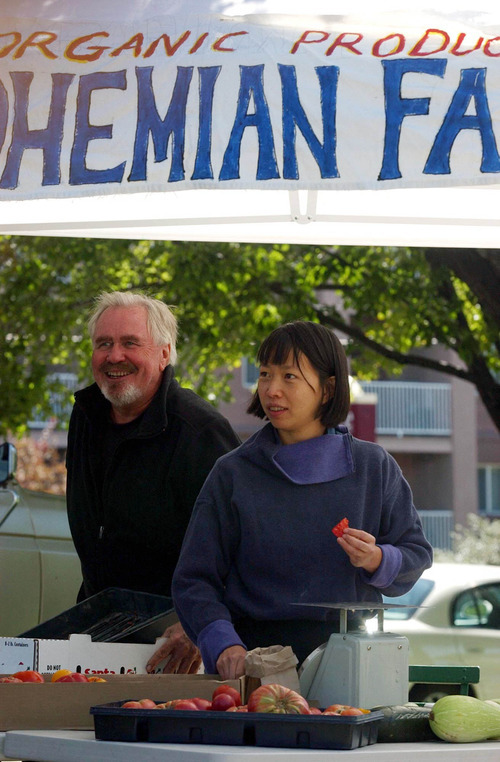This is an archived article that was published on sltrib.com in 2011, and information in the article may be outdated. It is provided only for personal research purposes and may not be reprinted.
The wide range of Kenvin Lyman's accomplishments is obvious in the diverse circle of artists and friends who were preparing for his memorial and wake Tuesday night at a local recording studio.
"Who else would have memorial celebration at One Mind [Studio]?" said Virginia Rainey, a food writer, as she prepared one of Lyman's recipes, Potatoes Sophia, for the gathering. Unfortunately, one of the ingredients, the herb lovage, is out of season. "I'll substitute lettuce leaf," she said.
Lyman would probably appreciate her winging it. He was an intuitive cook, cookbook writer and organic farmer who once supplied vegetables to local chefs.
Lyman, 68, died Feb. 6 from a head injury he suffered in a fall in his beloved Avenues neighborhood home.
His genius for gardening, food and wine emerged as a late addition to his résumé. Lyman, who earned a master's in fine art from the University of Utah, began his career as a visual artist.
By the late 1960s, he had co-founded two pioneering light-show companies: Flash & Edison Visuals, with photographer Mikel Covey, and in 1967, Rainbow Jam, with artist and filmmaker Richard Taylor. "It was a very artistic experience — doing art in real time," Covey remembers. "Nobody had seen anything like it."
Taylor and Lyman toured extensively with Rainbow Jam, "painting with light" for major bands, including Santana, Commander Cody, Ike and Tina Turner, Jethro Tull and extensively with the Grateful Dead.
As graphic artists they created rock posters now prized by collectors. "We were, very specifically, the pioneers of the psychedelic era in Utah," Taylor said. "Kenvin and I did 90 percent of the posters for the bands of that time. "
After touring the West Coast, Lyman and Taylor tried their luck in Los Angeles. Taylor settled into the scene and became a commercial and special-effects director, but Lyman didn't like the pace.
"He loved the mountains. He loved Utah," says Taylor, who created a multimedia show for Lyman's wake. "Those values were deep in his heart and he drew inspiration from them. His art and imagery reflect that."
Lyman continued to make forays into art and visual production centers, taught at the Kansas City Art Institute and traveled extensively with his wife, Sophia Angkasa (the namesake of his potato recipe).
"He lived in the same house all his life," Covey said. "He was an eclectic person with eclectic interests. An artist, a chef, an organic farmer, a raconteur, an illustrator with an international clientele. He did all of those things from Salt Lake City."
In fact, Lyman has two major projects expected to be completed this year.
First up, as The Utah Kid, Lyman recorded a music album with his old band.
Salt Lake City music producer Steve Auerbach met with Lyman two years to discuss an album of Americana music, influenced by Hank Williams, Neil Young and Bob Dylan. "We sat down and he starts plunking out these songs and I said, 'Man, where have you been hiding?' " recalls Auerbach. "Every one of them was an instant classic."
Lyman's other imminent project is a lushly illustrated cookbook that's also a memoir of ranch life in Spring Lake, near Santaquin.
As a digital artist, musician, organic farmer and "classic bohemian," Lyman never betrayed the values of the '60s, Taylor said. "He never strayed from that, ever.
"We were living it and we still are. Unfortunately Kenvin took a misstep," Taylor says. "We had expected him to live long and be playing guitar with us and trying to sing into our 80s."
An artistic life, well lived
See and hear the art of Kenvin Lyman on his website, The Utah Kid, http://www.theutahkid.com/theutahkid/Home.html. A celebration of Kenvin Lyman's life was held Tuesday, Feb. 8 at One Mind Studio, 216 W. Paxton Avenue (1170 South), Salt Lake City.



